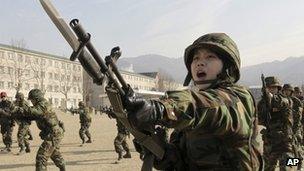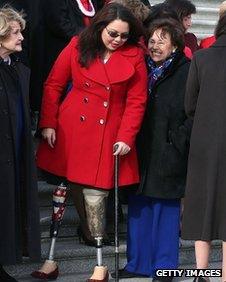Retired army officer calls for UK to allow women in combat
- Published

Many countries allow women to fight in combat roles and US has now followed suit
The UK should consider following the US and allow women to serve in combat roles, says a woman who became one of the most senior female army officers.
Brigadier Nicky Moffat, who retired in December, said it was wrong to dismiss people just on gender.
Major Judith Webb, who became the first woman to command an all-male field squadron disagrees.
She said resources would be wasted trying to train women up to a standard they were unlikely to reach.
On Thursday US Defence Secretary Leon Panetta lifted the military's ban on women serving in combat roles, potentially opening frontline positions to women.
Brig Moffat told the BBC Radio 4's Today programme: "Ultimately the responsibility for the operational effectiveness of the army and for the lives of the soldiers that are deployed lies with ministers and with the heads of the services and they must make that judgement."

Congresswoman Tammy Duckworth, a helicopter pilot who lost both legs in Iraq, has been a high profile supporter of women in combat
But she said that judgement should be made on the basis of "capability" and she was "deeply uncomfortable" with the idea of excluding a whole group of potentially capable soldiers, just because of gender.
She said "It is not just about physical strength. It's about endurance, it's about ability to operate within a team, it's about a range of skills.
"But we shouldn't dismiss the point about strength. The infantry combat fitness test is extraordinarily demanding and individuals are required to carry herculean amounts of kit.
"But if we look at the achievements of our women Olympians I don't think any reasonable person could say that there aren't some women who could meet those standards."
Brig Moffat said the British Army was in a difficult position because it worked closely with the US and the Canadian army, which has already allowed women into combat roles.
But Maj Webb previously told Today: "By opening it up to women are women shooting themselves in the foot? Because they are not going to meet those standards.
"Two women who made it through marine training in the US didn't qualify."
'Wasting resources'
She said: "So what are we achieving by trying to open it up to women, except wasting a huge amount of resources by trying to train women up to a level I don't think they are going to meet."
No women are deployed in the infantry where the primary role is to "close with and kill" the enemy - to engage in hand-to-hand combat.
But they do perform support roles, such as medical duties and at any one time about 500 to 600 women are in theatre in Afghanistan.
The armed forces are exempt from the 1975 Sex Discrimination Act "for the purpose of ensuring the combat effectiveness".
A Ministry of Defence spokesman said: "The vast majority of roles in the armed forces are open to women and hundreds are currently serving their country with distinction in Afghanistan.
"Women are fundamental to the operational effectiveness of the UK's Armed Forces, bringing talent and skills across the board.
"The MoD 2010 review into women serving in combat roles concluded there should be no change to the existing policy. There are no plans to review this policy before the end of operations in Afghanistan."
In the US President Barack Obama welcomed the "historic step" and a senior defence official said about 237,000 jobs would be newly open to women "who can meet the standards".
The decision was also welcomed by Congressman Tammy Duckworth, a former helicopter pilot who lost both legs in Iraq.
She wrote in the Chicago Tribune:, external "It's time we stop being surprised that America's daughters are just as capable of defending this nation as her sons."
- Published24 January 2013
- Published28 November 2012
- Published21 April 2012
- Published29 May 2012